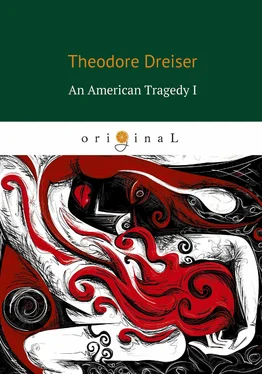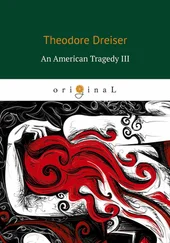Теодор Драйзер - An American Tragedy I
Здесь есть возможность читать онлайн «Теодор Драйзер - An American Tragedy I» — ознакомительный отрывок электронной книги совершенно бесплатно, а после прочтения отрывка купить полную версию. В некоторых случаях можно слушать аудио, скачать через торрент в формате fb2 и присутствует краткое содержание. Город: Москва, Год выпуска: 2018, ISBN: 2018, Жанр: foreign_prose, literature_20, на английском языке. Описание произведения, (предисловие) а так же отзывы посетителей доступны на портале библиотеки ЛибКат.
- Название:An American Tragedy I
- Автор:
- Жанр:
- Год:2018
- Город:Москва
- ISBN:978-5-521-06863-0
- Рейтинг книги:4 / 5. Голосов: 1
-
Избранное:Добавить в избранное
- Отзывы:
-
Ваша оценка:
- 80
- 1
- 2
- 3
- 4
- 5
An American Tragedy I: краткое содержание, описание и аннотация
Предлагаем к чтению аннотацию, описание, краткое содержание или предисловие (зависит от того, что написал сам автор книги «An American Tragedy I»). Если вы не нашли необходимую информацию о книге — напишите в комментариях, мы постараемся отыскать её.
An American Tragedy I — читать онлайн ознакомительный отрывок
Ниже представлен текст книги, разбитый по страницам. Система сохранения места последней прочитанной страницы, позволяет с удобством читать онлайн бесплатно книгу «An American Tragedy I», без необходимости каждый раз заново искать на чём Вы остановились. Поставьте закладку, и сможете в любой момент перейти на страницу, на которой закончили чтение.
Интервал:
Закладка:
At the moment, however, only hurt and rage were with her, and yet her lips did not twitch as did Asa’s, nor did her eyes show that profound distress which filled his. Instead she retreated a step and reexamined the letter, almost angrily, then said to Asa: “She’s run away with some one and she doesn’t say – ” Then she stopped suddenly, remembering the presence of the children – Clyde, Julia, and Frank, all present and all gazing curiously, intently, unbelievingly. “Come in here,” she called to her husband, “I want to talk to you a minute. You children had better go on to bed. We’ll be out in a minute.”
With Asa then she retired quite precipitately to a small room back of the mission hall. They heard her click the electric bulb. Then their voices were heard in low converse, while Clyde and Julia and Frank looked at each other, although Frank, being so young – only ten – could scarcely be said to have comprehended fully. Even Julia hardly gathered the full import of it. But Clyde, because of his larger contact with life and his mother’s statement (“She’s run away with some one”), understood well enough. Esta had tired of all this, as had he. Perhaps there was some one, like one of those dandies whom he saw on the streets with the prettiest girls, with whom she had gone. But where? And what was he like? That note told something, and yet his mother had not let him see it. She had taken it away too quickly. If only he had looked first, silently and to himself!
“Do you suppose she’s run away for good?” he asked Julia dubiously, the while his parents were out of the room, Julia herself looking so blank and strange.
“How should I know?” she replied a little irritably, troubled by her parents’ distress and this secretiveness, as well as Esta’s action. “She never said anything to me. I should think she’d be ashamed of herself if she has.”
Julia, being colder emotionally than either Esta or Clyde, was more considerate of her parents in a conventional way, and hence sorrier. True, she did not quite gather what it meant, but she suspected something, for she had talked occasionally with girls, but in a very guarded and conservative way. Now, however, it was more the way in which Esta had chosen to leave, deserting her parents and her brothers and herself, that caused her to be angry with her, for why should she go and do anything which would distress her parents in this dreadful fashion. It was dreadful. The air was thick with misery.
And as his parents talked in their little room, Clyde brooded too, for he was intensely curious about life now. What was it Esta had really done? Was it, as he feared and thought, one of those dreadful runaway or sexually disagreeable affairs which the boys on the streets and at school were always slyly talking about? How shameful, if that were true! She might never come back. She had gone with some man. There was something wrong about that, no doubt, for a girl, anyhow, for all he had ever heard was that all decent contacts between boys and girls, men and women, led to but one thing – marriage. And now Esta, in addition to their other troubles, had gone and done this. Certainly this home life of theirs was pretty dark now, and it would be darker instead of brighter because of this.
Presently the parents came out, and then Mrs. Griffiths’ face, if still set and constrained, was somehow a little different, less savage perhaps, more hopelessly resigned.
“Esta’s seen fit to leave us, for a little while, anyhow,” was all she said at first, seeing the children waiting curiously. “Now, you’re not to worry about her at all, or think any more about it. She’ll come back after a while, I’m sure. She has chosen to go her own way, for a time, for some reason. The Lord’s will be done.” (“Blessed be the name of the Lord!” interpolated Asa.) “I thought she was happy here with us, but apparently she wasn’t. She must see something of the world for herself, I suppose.” (Here Asa put in another Tst! Tst! Tst!) “But we mustn’t harbor hard thoughts. That won’t do any good now – only thoughts of love and kindness.” Yet she said this with a kind of sternness that somehow belied it – a click of the voice, as it were. “We can only hope that she will soon see how foolish she has been, and unthinking, and come back. She can’t prosper on the course she’s going now. It isn’t the Lord’s way or will. She’s too young and she’s made a mistake. But we can forgive her. We must. Our hearts must be kept open, soft and tender.” She talked as though she were addressing a meeting, but with a hard, sad, frozen face and voice. “Now, all of you go to bed. We can only pray now, and hope, morning, noon and night, that no evil will befall her. I wish she hadn’t done that,” she added, quite out of keeping with the rest of her statement and really not thinking of the children as present at all – just of Esta.
But Asa!
Such a father, as Clyde often thought, afterwards.
Apart from his own misery, he seemed only to note and be impressed by the more significant misery of his wife. During all this, he had stood foolishly to one side – short, gray, frizzled, inadequate.
“Well, blessed be the name of the Lord,” he interpolated from time to time. “We must keep our hearts open. Yes, we mustn’t judge. We must only hope for the best. Yes, yes! Praise the Lord – we must praise the Lord! Amen! Oh, yes! Tst! Tst! Tst!”
“If any one asks where she is,” continued Mrs. Griffiths after a time, quite ignoring her spouse and addressing the children, who had drawn near her, “we will say that she has gone on a visit to some of my relatives back in Tonawanda. That won’t be the truth, exactly, but then we don’t know where she is or what the truth is – and she may come back. So we must not say or do anything that will injure her until we know.”
“Yes, praise the Lord!” called Asa, feebly.
“So if any one should inquire at any time, until we know, we will say that.”
“Sure,” put in Clyde, helpfully, and Julia added, “All right.”
Mrs. Griffiths paused and looked firmly and yet apologetically at her children. Asa, for his part, emitted another “Tst! Tst! Tst!” and then the children were waved to bed.
At that, Clyde, who really wanted to know what Esta’s letter had said, but was convinced from long experience that his mother would not let him know unless she chose, returned to his room again, for he was tired. Why didn’t they search more if there was hope of finding her? Where was she now – at this minute? On some train somewhere? Evidently she didn’t want to be found. She was probably dissatisfied, just as he was. Here he was, thinking so recently of going away somewhere himself, wondering how the family would take it, and now she had gone before him. How would that affect his point of view and action in the future? Truly, in spite of his father’s and mother’s misery, he could not see that her going was such a calamity, not from the GOING point of view, at any rate. It was only another something which hinted that things were not right here. Mission work was nothing. All this religious emotion and talk was not so much either. It hadn’t saved Esta. Evidently, like himself, she didn’t believe so much in it, either.
Chapter 4
The effect of this particular conclusion was to cause Clyde to think harder than ever about himself. And the principal result of his thinking was that he must do something for himself and soon. Up to this time the best he had been able to do was to work at such odd jobs as befall all boys between their twelfth and fifteenth years: assisting a man who had a paper route during the summer months of one year, working in the basement of a five-and-ten-cent store all one summer long, and on Saturdays, for a period during the winter, opening boxes and unpacking goods, for which he received the munificent sum of five dollars a week, a sum which at the time seemed almost a fortune. He felt himself rich and, in the face of the opposition of his parents, who were opposed to the theater and motion pictures also, as being not only worldly, but sinful, he could occasionally go to one or another of those – in the gallery – a form of diversion which he had to conceal from his parents. Yet that did not deter him. He felt that he had a right to go with his own money; also to take his younger brother Frank, who was glad enough to go with him and say nothing.
Читать дальшеИнтервал:
Закладка:
Похожие книги на «An American Tragedy I»
Представляем Вашему вниманию похожие книги на «An American Tragedy I» списком для выбора. Мы отобрали схожую по названию и смыслу литературу в надежде предоставить читателям больше вариантов отыскать новые, интересные, ещё непрочитанные произведения.
Обсуждение, отзывы о книге «An American Tragedy I» и просто собственные мнения читателей. Оставьте ваши комментарии, напишите, что Вы думаете о произведении, его смысле или главных героях. Укажите что конкретно понравилось, а что нет, и почему Вы так считаете.









